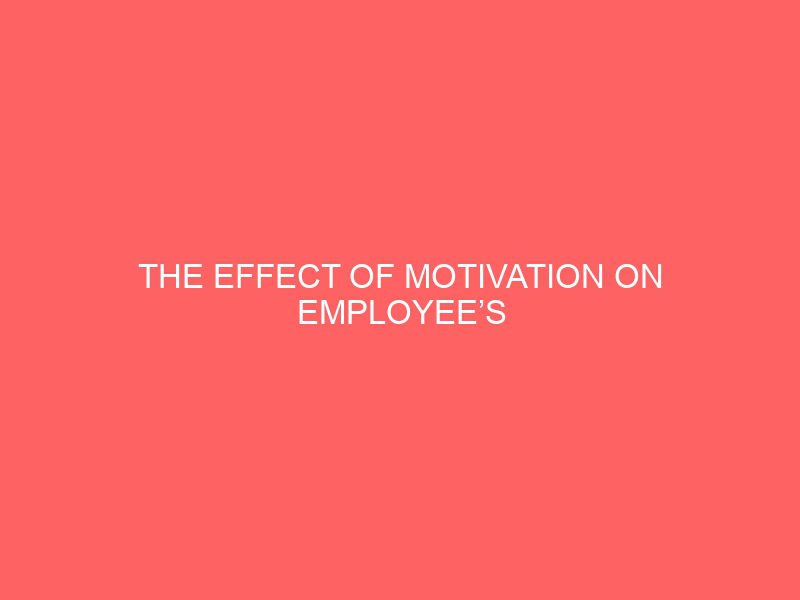Description
ABSTRACT
The research project attempt to examine the effect of motivation on employees’ performance in global polythene industry Kaduna. The objectives of the study amongst others are to determine the relationship between motivation and performance and to assess the adequacy of employees reward in global polythene industry. The researcher adopted questionnaire and interview in the collection of primary data and documentary evidences such as literature review for secondary data. It was found out that incentives are not the only tools for motivating employee’s other motivational factor or tools discovered includes good working tools, good work environment, equitable salaries, and recognition e.g. promotion. The researcher recommended that motivational tools such as training should be extended to junior staff and those employees should not be forced to own shares in the company.
CHAPTER ONE
INTRODUCTION
1.1 BACKGROUND OF THE STUDY
For an organization to operate smoothly there are must be motivation between the employer and there employees. Also noting the fact that the actors in our organization system are not the same, it is very obvious that there must be conflict between the parties from time to time. Therefore, what should be paramount to both the employer and the employee should be how to settle such conflicts and still go ahead without necessarily disturbing the system. This is where motivation comes in.
The problem of employees dissatisfied at work, poor motivational techniques are seen to have influence are the motivational techniques used by some personnel managers who think motivation is only giving money without job satisfaction. In motivating staff, their job problems must be considered and compared with that of the counterpart in other organization with as well as a designed working condition.
1.1 BACKGROUND OF THE STUDY
It is a known fact that the principal motive of management of any organization is to make individual and people contribute positively toward the activities which it consist. So as to achieve the mission of the enterprise employee is motivated.
Hermanan motives are based on need such as the psychological requirement for water, food and shelter. Other need may be regarded as secondary such as self esteem status, motivation has become one of the most indispensable factors in management towards the achievement of organizational goals and objectives.
Motivation is known to be the foundation for better performance and maximization of output in an organization when workers are not well motivated. Efficient use of their physical and metal doom for the organization because it is one of the success or failure of an organization.
There are motivational questions that need to be answered so that usage can be made of their mental and physical abilities for a maximization of output in the organization. In motivating staff for a better performance, their need must be satisfied.
1.2 STATEMENT OF PROBLEM
In the past years, there has been a steady increase in most Nigerian industries, the crisis is as a result of a poor working condition, stringent rules poor and delayed remunerations.
Also, the crisis results from the failure of the top management to appreciate to human element as the most crucial factor and the determination of attainment of goals and objectives. This result into frustration which manifest itself differently by individual or workers. It is view of this that this research intends to look at the effect of motivation on employee’s performance in an organization using global polythene leather industry as a case study.
1.3 OBJECTIVES OF THE STUDY
The objective of the study is to look at the impact of motivation in the achievement of organizational objectives; it is also intended to cover the following:
i) To identify how it increases output in all set goals and objectives.
ii) The study is carried out to identify the techniques used in motivating workers as regard to greater performance.
iii) To identify some factors that influence work performance as it relates to productivity.
iv) To identify the effect of lack of motivation on the performance of workers.
1.4 SIGNIFICANCE OF THE STUDY
The importance of this study is to bring the notice of organization to the effect of motivation bearing in mind the following:
Firstly, to enable both the management and the manger to appreciate the important of motivation to the attainment of organizational goals. Also to enable the management appreciate the need to experiment new concepts of motivation.
Secondly to highlight what factor motivates workers to perform their function effectively and involvement of staff in decision making process are also string factors of motivation and as well as promote harmonious co-operation between management and employees.
Also, the study in the open of the researchers will contributes in no small way to have knowledge in the area of management of human resources towards the attainment of organizational goals. It will also assist both secretary and management student in the Ministry of Human Relation Skills.
1.5 RESEARCH QUESTION
To assist the researcher to find solution to the problems mentioned, the following research question have been formulated.
1. What is the right motivational techniques used in worker to achieve the organization objectives?
2. What are those factors that motivates as workers in an organization?
3. What are the effects of lack of motivation on workers?
4. What are the roles motivations plays in the performance of a worker?
1.6 SCOPE AND LIMITATION OF THE STUDY
The study shall cover Global Polythene industry Kaduna. In relation to motivational tools been used toi affect its employees theories of motivational importance of motivation its imoact on the Nigerian working environment.
The limitation of the study includes
1. Inaccessibility of sufficient research material: The material used for the research were not readily available and adequately enough for a comprehensive research as desired by the researcher must comment lend books and other relevant publication in libraries within and outside school.
2. Uncooperative attitude of respondent: These were some respondents that were not ready to answer vital information for the purpose of this research such valuable information was considered to be confidential and as well were not ready to release secret of the organization.
3. Low return rate of questionnaire: Some of the questionnaire distributed to respondents without properly filling as such that they were not used in analyzing the data.
4. Academic pressure: This is the frequency test in school, assignments and always pay visit to library in the search of relevant materials lampered the researcher in writing a mane comprehensive and better research work done
1.7 DEFINITION OF TERMS
In research of this nature, it is quite necessary to define some of the key occurring terms.
The essence is to make operational in the contact in which they have been used.
Personnel: This refers to the people who work for an organization.
Performance: This is a measure of how well the personnel do in the organization so as to achieve the goals and objectives.
Satisfaction: The state of being contended pleased or the state of acquiring what one wants or need the act of satisfying.
Remuneration: This simply means in amount of money that is paid for somebody for the work that have been done.
Extrinsic: Makes individual to behave in a way because of some external inducement such as job context.
Intrinsic: Is that which makes individual to behaved in away
such as job context.
Efficiency: Is the ability to perform a given task according to a
required standard.
Productivity: The ratio of input to output.
Employee: Simply refers to any person employed by an
organization and been paid salary or wages at the end of the month.
Organization: This refers to a group of people that forms as
business club etc together to render to achieve a particular aim, this also means the act of making arrangement or preparation for something.






